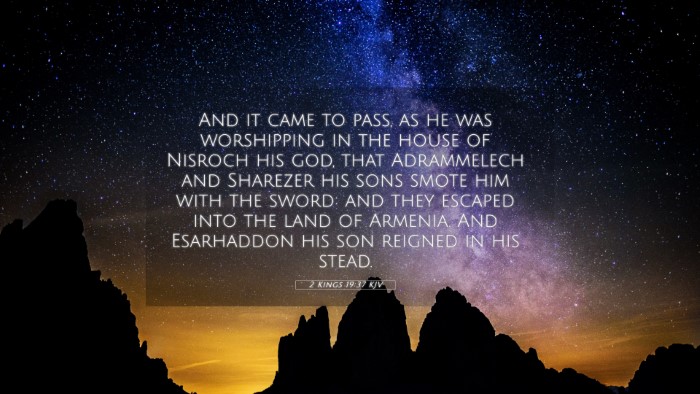Understanding 2 Kings 19:37
Verse: “And it came to pass, as he was worshipping in the house of Nisroch his god, that Adrammelech and Sharezer his sons smote him with the sword; and they escaped into the land of Armenia: and Esarhaddon his son reigned in his stead.”
Summary of 2 Kings 19:37
This verse concludes the narrative concerning King Sennacherib of Assyria, depicting a pivotal moment in divine judgment and the consequences of idolatry. After his defeat at the hands of the Israelites, Sennacherib seeks solace in the worship of his idol, Nisroch. However, his reliance on an idol culminates in his assassination by his own sons, illustrating the ultimate futility of turning from God and the pernicious nature of sin. The verse serves as a powerful reminder of God’s sovereignty and the consequences of rejecting His authority.
Commentary Insights
Matthew Henry's Commentary
Matthew Henry draws emphasis on the irony of Sennacherib's death occurring while he venerates his false god. It underscores a profound truth: idolatry is not only an affront to the Almighty but can also lead to one’s downfall. Sennacherib, who once boasted of his might and military prowess, is now shown to be vulnerable, ultimately meeting a violent end. Henry elaborates on the notion that God’s judgments may come in unexpected forms, one can worship false deities only to discover they are powerless in the face of divine will.
Albert Barnes' Notes
Albert Barnes comments on the significance of the names Adrammelech and Sharezer, indicating they may symbolize aspects of Assyrian monarchy and the internal strife that characterized Sennacherib's reign. Barnes highlights that the Assyrian attacks on Jerusalem did not only provoke God’s judgment but also sown discord within Sennacherib’s own household. This reflects the theme of how reliance on false gods leads to corruption and ultimately destruction. He notes that Sennacherib’s fate serves as a somber warning of the consequences inherent in opposing God.
Adam Clarke's Commentary
Adam Clarke provides insight into the circumstances surrounding Sennacherib’s assassination, suggesting that his death was not merely a political coup but also a divine retribution for his disbelief and hubris. He explains how the act of worship during critical moments can serve as a reflection of one's faith or lack thereof and notes the significance of Sennacherib's demise as a divine pronouncement against idolatry and tyranny. Clarke reinforces the prophetic nature of the earlier declarations towards Sennacherib, aligning this event with the broader narrative of divine justice throughout scripture.
Cross-References for 2 Kings 19:37
- Isaiah 37:7: God's declaration that a spirit will be sent to trouble Sennacherib.
- Isaiah 37:36-37: The divine intervention that led to the defeat of Sennacherib's army.
- 2 Chronicles 32:21: God's destruction of Sennacherib’s plans against Jerusalem.
- Psalm 46:9: God breaking the bow and cutting the spear; He brings peace.
- Jeremiah 49:36-37: Prophecy against the children of Ammon, linking to Sennacherib's judges.
- Habakkuk 1:11: A glimpse into the impending doom of nations reliant on their own might.
- Matthew 26:52: A New Testament reminder of the consequences of violence.
- Luke 12:5: Fear Him who can kill the body and cast into hell.
- Revelation 16:7: Affirmation of God’s true justice and judgment.
Thematic Connections
This verse invites readers to explore broader themes within the Bible, creating connections between the narratives of kings and their respective judgments:
- Judgment and Idolatry: The story presents a direct correlation between worshiping false gods and experiencing divine wrath.
- Divine Sovereignty: God’s authority over nations and rulers is showcased through the downfall of Sennacherib.
- In-house Betrayals: Historical patterns show that treachery often arises in the context where tyranny prevails.
- Consequences of Pride: Sennacherib's story echoes throughout scriptures where pride leads to a fall.
- Hope Amidst Destruction: Even in despair, God provides protection and deliverance to His people.
Inter-Biblical Dialogue
The examination of 2 Kings 19:37 promotes a rich dialogue across the Scriptures, illustrating links and foundational principles applicable to the entirety of the Biblical narrative:
- Consider how Sennacherib's reliance on idolatry reflects the recurring theme of Israel's own struggles with faithfulness, as seen in Exodus 20:3-6.
- This verse offers insights into the concept of spiritual warfare as evident in the New Testament as Jesus engages with spiritual powers in Ephesians 6:12.
- The contrast between earthly kingship and God's sovereignty is depicted throughout both the Old and New Testament, particularly in Philippians 2:10-11.
- In light of Romans 1:22-23, Sennacherib’s ill-fated worship serves as a characteristic example of exchanging truth for lies.
Conclusion
In summary, 2 Kings 19:37 serves as a powerful concluding verse that encapsulates the providence and justice of God. Through various commentaries, one discerns important lessons about idolatry, the futility of relying upon false gods, and the eventual outcome of divine judgment. The cross-references only amplify the verse's meanings, linking these themes across both testaments and underscoring the continuity of God's revelation through history. Such reflections are crucial for those studying the Scriptures and seeking deeper insights into the interwoven narratives and themes within God’s Word.














